Moving to Brazil
Evidence of Brazil’s diverse cultural influences are noted in Brazil’s music, food, and festivals throughout the year. Home to the world’s largest tropical rainforest, the Amazon rainforest, Brazil is one of the largest and most topographically varied countries in the world. It’s abundant natural resources have led to prosperity throughout Brazil’s past, and coffee, sugar cane, and rubber have all been important products for the economy.
Politics in Brazil has seen a line of disappointing leaders and a military dictatorship over the past century, meaning that the people generally view the government and people in power with a certain level of suspicion. Corruption has been uncovered in the government in the recent past and it is still a large part of Brazil’s culture. Be prepared for their chaotic sense of humour surrounding government elections and a passionate culture of protest.
Learning the Language of Brazil
The primary language for everyday situations and business continues to be Portuguese, so it’s vital that you learn or begin to learn the language before moving to Brazil. It’s important to note that Portuguese and Spanish are vastly different languages, so knowledge of Spanish will be of no use. To assist you, there are many language schools for you and your family to attend classes once you have arrived in Brazil. These can be in person, such as BridgeBrazil in Rio de Janeiro and Instituto Cultural Idioma in Salvador, or held online, also run by ICI via Skype. International schools typically teach Portuguese as a second language.
There is a very large foreign community in Brazil, and many choose to only learn a few phrases in Portuguese. The people of Brazil are friendly and are usually willing to help foreigners and new arrivals, even when understanding is a difficulty. You should be wary of being cheated or misled when you don’t understand the language.

Getting Ready to Go
When moving to Brazil with a company, you should make enquiries about the assistance your employer can offer you. In some cases, they will be able to provide assistance in acquiring the correct documents, such as passports, visas, and other permits required for immigration. It’s important to take advantage of any assistance to ensure you and your employer are acting in compliance with laws in Brazil.
Passports
When travelling anywhere abroad, it’s vital that every person has a passport. This passport should be valid and should remain valid for the period of intended stay in your destination country. You should also check with the authorities of your destination country for any additional requirements.
Visas
Visas are proof of the authorisation of your presence in a foreign country. These are specific to the length of time of your stay and the purpose of your visit. This can be stamped in your passport, on a separate piece of paper, or electronically. If your visit is work related, you will likely require a work permit to accompany the appropriate visa, but you should check with your destination country before making arrangements.
If you are moving to Brazil from the UK, note that British residents can remain in Brazil for up to 90 days without acquiring a visa, with the possibility to extend your stay for another 90 days. If you are looking to relocate on a permanent basis, you will need to consult the Brazilian Consulate in London for the most accurate information on Brazilian visas. Types of long-term visas include the Permanent visa, Working visa and Investor’s visa and more. Below are the most popular visas among expats:
- Long-term work visa: This visa allows individuals with highly specialised skill sets that would benefit the Brazilian economy to remain in Brazil for a long period of time. You will need to acquire your work visa before you take up employment in Brazil, but your employer is typically responsible for starting the application process by submitting relevant documents.
- Business visa: The business visa is eligible for foreign citizens that wish to travel to Brazil for business purposes but not to enter employment. This visa is valid for a period of up to 90 days but can be extended for an additional 90 days.
Short-term work visa: For people travelling to Brazil for a specific work position for a limited contract, the short-term work visa is ideal. With this visa, you are not permitted to change jobs during your stay in Brazil. Family members dependent on the visa holder are permitted to accompany the visa holder but not allowed to begin working.
Permits
To be able to work or be a resident in Brazil, you will need to acquire a permit. There are temporary or permanent work permits available. Temporary permits are usually valid for a period up to 2 years and can only be re-issued once. After 4 years, your employer may apply to switch your temporary permit to a permanent permit to work in Brazil.
There are many types of residence permits to suit different circumstances. These include marriage and family residency for partners of Brazilian nationals.
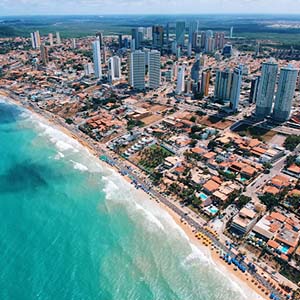
Custom Requirements
Foreigners that will reside in Brazil for over 1 year may import household goods and goods necessary to their profession duty-free. You must organise a baggage list which must be legalised by a Brazilian Consulate along with your visa at least 3 weeks prior to your departure date. If you are shipping an inordinate amount of household goods into Brazil, you may be subject to customs checks due to suspicion of smuggling. For people travelling under temporary visas, items meant for personal or professional use may be imported for a specified period with suspended taxation. If you choose to take no baggage when moving to Brazil, you must sign a declaration stating “I am not taking any household goods to Brazil and am aware that I cannot apply to have a baggage list legalized in the future.”
All property entering Brazil must appear on an itemized list on forms supplied by the Brazilian Consulate. Each page must be signed and dated by the applicant and the signature on the last page must be notarised, with 5 copies being made of each page. Declared property must enter customs within 180 days of the arrival date. Your shipment inventory must include:
- 2 separate inventories: one for used items and one for items newer than 6 months old.
- Itemised list in Portuguese with brand, make, model and serial numbers for electrical items.
- Estimated value in US dollars.
- Legalisation by the Brazilian Consulate for temporary visa holders.
- Pets listed on inventory.
If the value of your goods exceeds the quota, currently at US$500 per family member, your goods will be subject to duty tax of 50%. Taxable items will be held by customs authorities until you pay customs duties, at which point your goods will be released. You should keep all travel documents and identification, including your arrival airplane ticket, to ensure release of your shipment.
As part of our relocation services, we can assist with visa and immigration applications and advice. Request a free quote for our services today.
Taking my Pet to Brazil
Before deciding to move to Brazil with your pet, you should consider the effects of the semi tropical climate there. Dogs in particular can find the warmer climate too stressful and can become unwell. If your pet is at risk, you should consider leaving it at home. Note that the import and export of pet birds can pose an issue.
If you do choose to travel with your pet, you should select a veterinarian promptly upon arrival to keep inoculations up to date and follow recommended sanitary precautions. English-speaking practices can be found in Rio and São Paulo. You should also always walk your dog on a leash to avoid contact or problems with stray dogs in Brazil.
To import your pet to Brazil, you will need to bring a health certificate from your UK veterinarian to state that all vaccinations are up to date and confirm the health of the animal. A Certificate of Veterinary Inspection should be stamped by the USDA and validated at your home-country Brazilian Consulate. This certificate should be in Portuguese and stamped at customs on arrival. If these are present, there should be no quarantine period for your pet. You or a personal representative must receive the pet at the airport when it arrives. These details are subject to change to be sure to consult the Brazilian Consulate in your home country before making arrangements. Exporting pets require similar measures, though documentation must be certified by the Ministry of Agriculture.
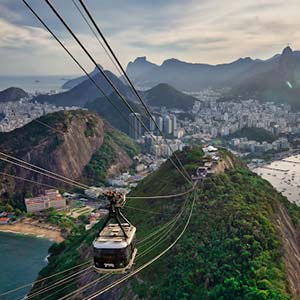
Taking a Vehicle
Before deciding to import your vehicle from the UK, you should ascertain the need for the vehicle for life in Brazil. This will include considering your commute to work and, if moving with children, to schools. As public transportation can be crowded and not particularly safe, many expatriate families choose to drive cars in Brazil.
Brazilian customs forbid used motor vehicles being imported. New motor vehicles are not permitted to be imported as part of household shipments and are not exempt from import duty. Importing new vehicles is an expensive and complex process and obtaining spare parts for these locally can prove difficult. Adaptations to steering wheels are not done in Brazil so if your existing car has a steering wheel on the right, it’s best to leave your car at home. Additionally, around 50% of Brazil’s cars use pure ethanol, so imported cars will need to be adapted for such types of fuel.
Buying a car locally is a popular choice among expats moving to Brazil. There are a variety of car makes, both new and used, available for purchase, and buying a car is considered to be less expensive than leasing one.
Financial Services in Brazil
When moving to Brazil from the UK you will be pleased to find that the banks provide a full range of services and conveniences, offered online and offline. Transaction fees may be higher than you are used to in the UK.
If you are planning to be moving to Brazil for more than 1 year, getting a checking account is essential. This is the most popular way to complete transactions and the most secure way. For local accounts, you must have a temporary or permanent resident visa, and you should also keep a checking account in your home country. Opening a local account will require you to have an identity card (RNE), an income tax (CPF) number, a work permit, proof of income and proof of residence. If local companies or people can provide references, this may help the process. It’s recommended to begin the process of opening an account as soon as you can as the wait for required documents can be extensive.
There are typically two types of checking accounts offered in Brazil; a regular checking account and a ‘cheque especial’, which will provide you with privileges such as an overdraft and checks up to a certain value. You’ll also receive a card that will double as identification and state the maximum guaranteed amount which will be accepted anywhere.
Currency and Exchange
The currency of Brazil is the real (R$ or BRL), pronounced HAY-ow, the plural being reais, pronounced HAY-ice. 1 real is made up of 100 centavos, and common coin denominations consist of 1 centavo, 5, 10, 25, 50 centavos, and R$1. Paper bills come in denominations of R$1, R$2, R$5, R$10, R$20, R$50 and R$100. Also note that decimals are written as commas and vice versa, so ten thousand five hundred reais and seventy-five centavos is written R$10.55,75. Real is often difficult to obtain outside of Brazil, but it is freely convertible. Amounts over R$10,000 must be declared at customs.
Airports have facilities to exchange money, as well as travel agencies and some shopping centres, but banks will offer the best rates for exchanging currency. Coins in small denominations are typically in short supply so you should save these for small purchases or tips.
Finding Accommodation in Brazil
The vast majority of expatriates who move to Brazil choose to rent accommodation rather than to buy property. Buying property in Brazil can be a complex process for foreigners, and rental prices can be negotiated with the help of agents or your company.
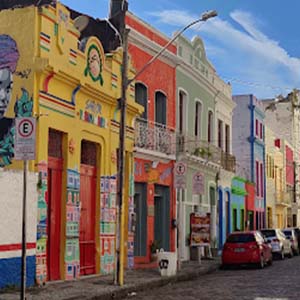
Rental Leases and Fees
When signing a contract, it is typically required that you pay the first month’s rent in advance, with the following months’ rent paid at the end of each month. Rent may increase annually in accordance with inflation. Security deposits are not always required but normally equate to roughly 3 months’ rent. When renting accommodation, you will also pay property taxes, utilities, and sometimes share the cost of maintenance of the building and facilities. Leases, according to Brazilian law, can be as short as 30 days and as long as 30 months.
After signing a lease, you may move in after 2-10 days, and it is sometimes required to have properties painted at the end of leases. You should make arrangements to change the locks when you move into a new property, and you will often be responsible for the connection of utilities. If renting a furnished property, always take inventory and note the condition of all items in the apartment or house, as you could be charged for missing or damaged items.
Expatriates renting in Brazil should have a Diplomatic Clause in their rental contract, which allows tenants to break the contract after 12 months in case of transfer by their company. In this case, the tenant must give one months’ written notice but will not be fined for terminating the lease. Terms of this lease are often open for negotiation.
Before you sign any rental lease, you should have the document checked by a lawyer. You will need to have the lease signed by a guarantor (fiador) in addition to the property owner and the tenant, and guarantors are commonly employers. People who have lived in Brazil for at least two years pay a seguro fiança of 112% of one month’s rent rather than having a fiador.
Where Should I Live in Brazil?
When deciding where to live in Brazil, you should choose to live close to your work office and schools, if you are moving to Brazil with children. Neighbourhoods in cities are known as barrios in Brazil and there are usually many to choose from. Note that there is heavy traffic in most cities, particularly in the later afternoon, so returning home from work could take an hour or more. Listed below are the major cities in Brazil and the communities most popular among expatriates moving to Brazil:
Brasília: As the capital of Brazil, Brasília is popular among expatriates for the high quality services and international community. The city centre offers large but ageing apartment buildings for people who want to have good access to the nightlife and shops of the city. Larger country-style homes are located East of the city centre near Lago Paranoá. When moving to Brasília, you should consider acquiring a car as public transport can be unreliable.
Campinas: Located in south-eastern Brazil, Campinas is an important economic and agricultural city for the country. Near the city centre, Cambui is an older residential barrio with high-quality apartment living and convenient facilities. Around 8 minutes southeast of the centre, Gramado offers quieter living, with safe, green gated communities. Further south of the city centre, around 15 minutes’ drive, are Valinhos and Vinhedo, both high-quality suburban areas with stunning natural surroundings and gated communities. Facilities, such as schools, churches, banks, and supermarkets, are also readily available.
Porto Alegre: Porto Alegre is one of Brazil’s largest cities and has large commercial and industrial importance. Rental prices are usually quite expensive in Porto Alegre but houses are generally found cheaper than apartments. It may be difficult to find furnished accommodation as they are in short supply. Areas that are popular among expats include Bela Vista, Boa Vista, Chácara das Pedras, Higienópolis, Moinhos de Vento, and MontSerrat. For more spacious living and gardens situated near the Guaiba River, the neighbourhoods of Ipanema, Vila Assunção, Villa Conceição, or Zona Sul/Southern Zone are just 20 minutes from the city centre.
Rio de Janeiro: This is a particularly popular place for tourists and can become very busy with traffic at peak times. Expatriates living in Rio generally prefer the Zona Sul or South Zone, which contains the largest shopping centres, international clubs, transport links, and other facilities. Beachfront rentals will command extremely high prices.
São Paulo: The area of Greater São Paulo is a large metropolitan area containing many neighbourhoods and suburbs. Again, the Zona Sul, or South Zone, is most popular among expats. This area contains large shopping centres, expatriate associations, and convenient transport links. In São Paulo there are also good commercial areas, such as Jardins and Itaim, which are perfect for single people to enjoy the best restaurants and shops. For families, the best areas are Vila Nova Conceição, Alto da Boa Vista, Jardins, Paulistano, and Morumbi. These are close to malls and many international schools.
Short-term Housing
In the cities of Rio and São Paulo, there are temporary furnished accommodation available called Apart Hotels or other flat services. These typically consist of furnished apartments with one or two bedrooms that include cleaning services and kitchen facilities, with some larger accommodations available. These locations are similar to hotels but are typically used by executives for short visits to Brazil.
Gerson relocation aims to deliver safe and high-quality accommodation for you and your family. Learn more about our short-term serviced accommodation search.
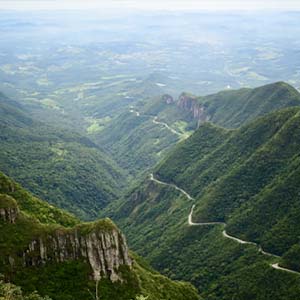
Getting Around - Do I Need a Car?
For expatriates moving to Brazil, public transportation is not recommended as a way of getting around. Expatriates moving with families, particularly in São Paulo, will find one or even 2 cars necessary to everyday life. Importing cars to Brazil is a long and complicated process, so acquiring vehicles in Brazil may be an easier option for expats. It’s also possible to rent or lease vehicles.
Driving Conditions
In south-eastern Brazil, there is a good highway system in place, however in the Northeast and central Brazil, roads tend to be poor quality and unreliable. Major cities are normally connected with modern, paved roads but there are poor quality facilities for food, fuel, and lodging on the roadside. Road signs are normally written in Portuguese and international signs, but you should be prepared for Brazilians to ignore traffic lights and road signs.
A copy of the rules of the road are available at driving schools or at the Motor Vehicle Department.
Vehicles drive on the right side of the road in Brazil, meaning all cars should be adapted accordingly. Driver attitudes in Brazil can make driving hazardous. Lane dividers, one-way streets, footpaths, stop signs, and traffic lights are not treated seriously, so you should be prepared for anything. Keep up with traffic speeds and always allow larger vehicles right of way.
When turning or changing lanes, use your signal, but also attempt to make eye contact with other drivers and motion with your hand. If you see a yellow traffic light, do not stop suddenly, as the driver behind you will likely not stop. Do not accelerate quickly when lights turn green as drivers will often disregard traffic signals. Horns are used constantly so do not be alarmed and buses without horns will rev their engines.
Driving at night can be dangerous in big cities so many expats use taxis instead. At night, Brazilians have a tendency to drive without their headlights, and will turn them on only to warn approaching vehicles that they wish to pass. Past midnight, most drivers will not stop for red lights, so take extra precaution.
In addition, city street parking can be difficult to find, but paid parking lots are available for various fees depending on your location. You can buy Blue Zone parking tickets one at a time or in a booklet of 10.
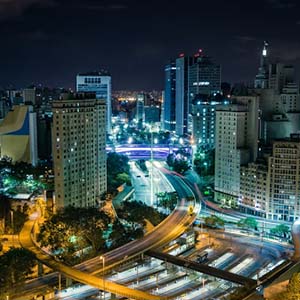
Driver’s License
If you are moving to Brazil for more than 6 months and choose to drive, you are required to carry an International Driver’s Permit (IDP) in addition to your home license or a Brazilian license. You should request an IDP before departing your home country and it will need to be stamped by the Motor Department in Brazil. These are valid for 1 year after the issue date. The name on your IDP should be the same name as on your passport.
If your home country does not have an agreement with Brazil for a license exchange, you must go through the driver education and testing process. This will consist of education at a Brazilian driving school and a four-part test, all in Portuguese.
Vehicle Insurance
Road tax in Brazil includes basic third-party vehicle insurance that will cover personal injuries. This is the only required insurance in Brazil, but it is highly recommended to acquire more comprehensive insurance from a private insurance company.
Insurance in Brazil must be purchased through a broker and cannot be purchased from the insurance company directly. Reputable brokers are recommended to avoid scams. Comprehensive and collision insurance prices are more expensive than other countries, but liability is much lower. Make sure you add any additional coverage you wish, including coverage for damage by uninsured drivers or hit-and-run motorists. Discounts are available for those who have not filed claims.
When renting a vehicle, the company will assist in choosing insurance if you request it.
Vehicle Insurance
It’s compulsory to obtain third-party insurance in India, normally provided by a local insurer. Due to difficult driving conditions and high accident rate, you should carry additional coverage to protect yourself. Insurance claims take a long time to be processed and you can expect waits up to 12 months for settlement. Premium discounts can be awarded if you are able to show proof of accident-free driving from your most recent insurance agency.
Public Transit in Brazil
Public transport in many cases is not recommended for expats or foreign tourists. Below is a breakdown of the transport services provided in Brazil:
Buses: Travelling by bus within cities is inexpensive, however it is likely that they are noisy, dirty, crowded, and not very safe. Executive express buses can be a safe and comfortable way to travel around cities. There are also long-distance buses which are clean, comfortable, well-serviced, and punctual. Travel between major cities is affordable and usually departs from stations on the outskirts of cities. Luxury buses are also available that offer special amenities.
Trains: There are fairly limited passenger rail connections in Brazil. Trains run from Rio to São Paulo and Belo Horizonte, with the overnight trains on these lines offering air-conditioned travel, a restaurant, and a bar. There are also other connections to Brazil’s other major cities and commuter trains are found in several cities across Brazil.
Taxis: Taxis are a popular choice for expat travel around Brazil. Taxis have red license plates with white numbers across the country and are metered. Common taxis, taxis comuns, are the cheapest taxis and can be hailed on the street. Most drivers only speak Portuguese, but you may be able to request an English-speaking driver if you phone or a taxi. Radio cabs are white, metered, and around twice as expensive as common taxis. Drivers don’t expect tips from passengers but it’s common practice to tell the driver to ‘keep the change’.
Expatriate Community in Brazil
The Expatriate community in Brazil hails from a variety of foreign countries around the world but are well integrated into Brazilian life. Brazilian people are typically very hospitable and will welcome those that accept them as they are and who show interest in learning about Brazil.
Despite this, Expats may find that the majority of their social contacts are other Expatriates. There are countless opportunities to meet new people, either through business contacts, church related activities, social clubs, sport clubs, parent groups, and more. There are also long-established networks of services and clubs, such as the International Newcomers’ Club, in Rio and São Paulo.
Religious Worship
There are many Roman Catholic churches throughout Brazil, with some conducting services in English for the international community. There are also various Protestant services conducted in English and other foreign languages. Major cities have Jewish synagogues and Buddhist temples too. To find religious services suitable for you and your family, consult your country’s embassy or consulate for more information.
Social Customs in Brazil
Brazilians are typically very passionate and expressive people, so you should expect very different from the more reserved behaviour in the UK. When greeting one another, men may hug and back slap their friends while women and men might kiss each other lightly on the cheek. In Rio, kisses from one side to the other is done 3 times, whereas in São Paulo it’s only done twice. When meeting people for the first time, handshakes are common. A firm handshake is sure to make a good impression on business associates.
Men should be addressed by Senhor plus his first name and women as Senhora plus her first name. First names are used early in relationships in Brazil, but you should wait until you are asked to do so. This is not a sign of familiarity, rather a sign of the more informal culture around names in Brazil. Even doctors, professors, and priests will go by their titles plus their first names. Most Brazilians have two surnames, one gained from each parent, with the mother’s surname usually written before the father’s.
Body Language and Gestures
Brazilians will often stand very close to one another when talking and touch each other frequently in conversation. Backing away from your conversation partner might be taken as a sign of aloofness. Eye contact is an essential part of conversation and conveys sincerity.
To show approval, Brazilians use the thumbs up sign, pull their ears, or smack their lips with their fingers. Other common gestures include:
- Snapping the fingers while whipping the hand up and down, adding emphasis to a statement or indicating “long ago”.
- Placing the thumb between the index and middle finger while making a fist, which is a way of invoking good luck.
- Flicking the fingertips underneath the chin, which indicates that one does not know the answer to a question.
- To beckon to someone, extend the hand palm down and wave the fingers toward the body.
Some gestures do not translate from the UK to Brazil. For example, the sign for okay, or punching a first into one’s open palm. These are considered obscene gestures and should be avoided.
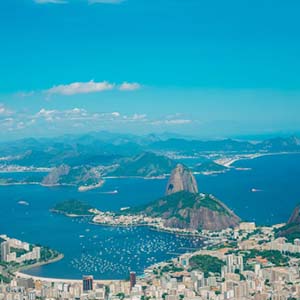
Alcohol and Drinking in Brazil
18 years old is the legal drinking age in Brazil, as it is in the UK. Beer is considered to be a man’s drink, particularly in public, while women tend to drink wine, liqueurs, or spirits. Toasts are not considered particularly formal but you should make sure to drink when they are given.
Tipping
Many people in Brazil depend on tips so tips are given for most services. If you are not sure, it’s best to tip anyway. For basic services, an amount equal to a local bus fare is adequate. For services such as loading groceries into your car or cleaning car windows, more of a tip is usually expected. For those that watch your car when you park it in a public place, tip a smaller amount.
When eating in restaurants, a 10% service charge is usually added to the bill which should account for the tip, however if service is excellent, you can give more if you wish to. Tips are given more frequently at Christmas time to everyone providing a service, from garbage collectors to street guards.
We understand that every move is unique. Our relocation services are dedicated to finding the best services and solutions for your unique requirements. Get in touch today for a free quote for your international relocation.
Interested in information on another country? Take a look at our other International Relocation guides.
Great customer Experiences start here
Very pleasent and helpful. Nothing too much trouble.
Mr M H moved from London, UK to Toronto, Canada
Very helpful and patient even when things got packed that we had to get out again!
Mr M E moved from Enfield, UK to Dorset, UK
Thanks to Graham, Nick and the entire crew!
Mr C D M moved from UK to Singapore
Friendly and helpful crew.
Ms T W moved from USA to Cambridgeshire, UK
